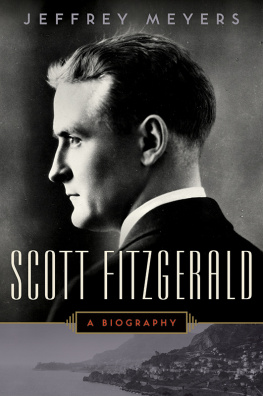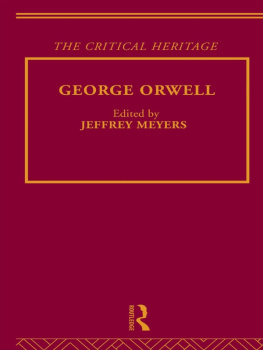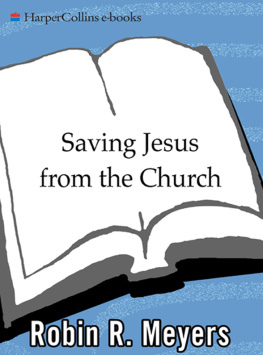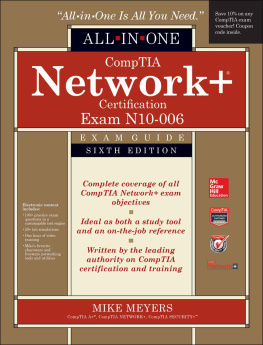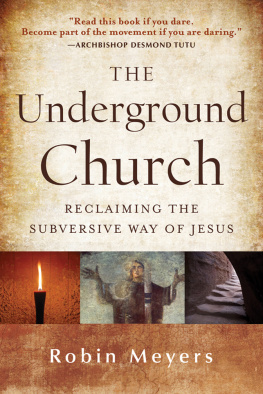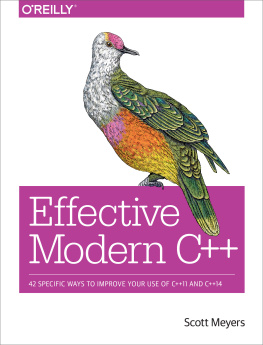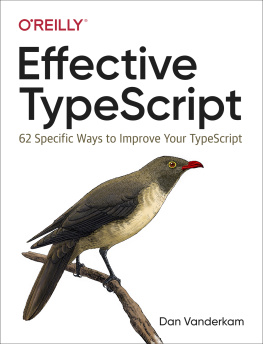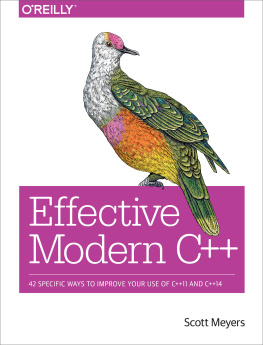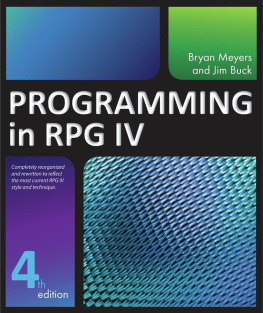Meyers - More effective C++: 35 new ways to improve your programs and designs
Here you can read online Meyers - More effective C++: 35 new ways to improve your programs and designs full text of the book (entire story) in english for free. Download pdf and epub, get meaning, cover and reviews about this ebook. City: Boston, year: 2014;1996, publisher: Pearson Education Limited (US titles);Addison-Wesley, genre: Computer. Description of the work, (preface) as well as reviews are available. Best literature library LitArk.com created for fans of good reading and offers a wide selection of genres:
Romance novel
Science fiction
Adventure
Detective
Science
History
Home and family
Prose
Art
Politics
Computer
Non-fiction
Religion
Business
Children
Humor
Choose a favorite category and find really read worthwhile books. Enjoy immersion in the world of imagination, feel the emotions of the characters or learn something new for yourself, make an fascinating discovery.

More effective C++: 35 new ways to improve your programs and designs: summary, description and annotation
We offer to read an annotation, description, summary or preface (depends on what the author of the book "More effective C++: 35 new ways to improve your programs and designs" wrote himself). If you haven't found the necessary information about the book — write in the comments, we will try to find it.
More effective C++: 35 new ways to improve your programs and designs — read online for free the complete book (whole text) full work
Below is the text of the book, divided by pages. System saving the place of the last page read, allows you to conveniently read the book "More effective C++: 35 new ways to improve your programs and designs" online for free, without having to search again every time where you left off. Put a bookmark, and you can go to the page where you finished reading at any time.
Font size:
Interval:
Bookmark:
"This is an enlightening book on many aspects of C++: both the regions of the language you seldom visit, and the familiar ones you THOUGHT you understood. Only by understanding deeply how the C++ compiler interprets your code can you hope to write robust software using this language. This book is an invaluable resource for gaining that level of understanding. After reading this book, I feel like I've been through a code review with a master C++ programmer, and picked up many of his most valuable insights."
Fred Wild, Vice President of Technology, Advantage Software Technologies
"This book includes a great collection of important techniques for writing programs that use C++ well. It explains how to design and implement the ideas, and what hidden pitfalls lurk in some obvious alternative designs. It also includes clear explanations of features recently added to C++. Anyone who wants to use these new features will want a copy of this book close at hand for ready reference."
Christopher J. Van Wyk, Professor, Mathematics and Computer Science, Drew University
"Industrial strength C++ at its best. The perfect companion to those who have read Effective C++."
Eric Nagler, C++ Instructor and Author, University of California Santa Cruz Extension
"More Effective C++ is a thorough and valuable follow-up to Scott's first book, Effective C++. I believe that every professional C++ developer should read and commit to memory the tips in both Effective C++ and More Effective C++. I've found that the tips cover poorly understood, yet important and sometimes arcane facets of the language. I strongly recommend this book, along with his first, to developers, testers, and managers ... everyone can benefit from his expert knowledge and excellent presentation."
Steve Burkett, Software Consultant
35 New Ways to Improve Your Programs and Designs
Scott Meyers

Boston San Francisco New York Toronto Montreal
London Munich Paris Madrid
Capetown Sydney Tokyo Singapore Mexico City
Many of the designations used by manufacturers and sellers to distinguish their products are claimed as trademarks. Where those designations appear in this book, and the publisher was aware of a trademark claim, the designations have been printed with initial capital letters or in all capitals.
The author and publisher have taken care in the preparation of this book, but make no expressed or implied warranty of any kind and assume no responsibility for errors or omissions. No liability is assumed for incidental or consequential damages in connection with or arising out of the use of the information or programs contained herein.
The publisher offers excellent discounts on this book when ordered in quantity for bulk purchases or special sales, which may include electronic versions and/or custom covers and content particular to your business, training goals, marketing focus, and branding interests. For more information, please contact:
U.S. Corporate and Government Sales
(800) 382-3419
corpsales@pearsontechgroup.com
For sales outside the United States please contact:
International Sales
international@pearsoned.com
Library of Congress Cataloging-in-Publication Data
Meyers, Scott (Scott Douglas)
More effective C++: 35 new ways to improve your programs and
designs / Scott Meyers.
p. cm.(Addison-Wesley professional computing series)
Includes bibliographical references and index.
ISBN 0-201-63371-X (paperback: alk. paper)
1. C++ (Computer program language) I. Series.
QA76.73.C153M495 1996
005.13'3dc20 9547354
CIP
Copyright 1996 by Addison-Wesley
All rights reserved. Printed in the United States of America. This publication is protected by copyright, and permission must be obtained from the publisher prior to any prohibited reproduction, storage in a retrieval system, or transmission in any form or by any means, electronic, mechanical, photocopying, recording, or likewise. For information regarding permissions, write to:
Pearson Education, Inc
Rights and Contracts Department
501 Boylston Street, Suite 900
Boston, MA 02116
Fax (617) 671-3447
ISBN-13: 978-0-201-63371-9
ISBN-10: 0-201-63371-X
Text printed in the United States on recycled paper at Courier in Stoughton, Massachusetts.
Twenty-fourth printing April 2007
For Clancy,
my favorite enemy within.
A great number of people helped bring this book into existence. Some contributed ideas for technical topics, some helped with the process of producing the book, and some just made life more fun while I was working on it.
When the number of contributors to a book is large, it is not uncommon to dispense with individual acknowledgments in favor of a generic "Contributors to this book are too numerous to mention." I prefer to follow the expansive lead of John L. Hennessy and David A. Patterson in Computer Architecture: A Quantitative Approach (Morgan Kaufmann, first edition 1990). In addition to motivating the comprehensive acknowledgments that follow, their book provides hard data for the 90-10 rule, which I refer to in .
With the exception of direct quotations, all the words in this book are mine. However, many of the ideas I discuss came from others. I have done my best to keep track of who contributed what, but I know I have included information from sources I now fail to recall, foremost among them many posters to the Usenet newsgroups comp.lang.c++ and comp.std.c++.
Many ideas in the C++ community have been developed independently by many people. In what follows, I note only where I was exposed to particular ideas, not necessarily where those ideas originated.
Brian Kernighan suggested the use of macros to approximate the syntax of the new C++ casting operators I describe in .
In , my warning about deleting an array of derived class objects through a base class pointer is based on material in Dan Saks' "Gotchas" talk, which he's given at several conferences and trade shows.
, the proxy class technique for preventing unwanted application of single-argument constructors is based on material in Andrew Koenig's column in the January 1994 C++ Report.
James Kanze made a posting to comp.lang.c++ on implementing postfix increment and decrement operators via the corresponding prefix functions; I use his technique in .
David Cok, writing me about material I covered in Effective C++, brought to my attention the distinction between operator new and the new operator that is the crux of . Even after reading his letter, I didn't really understand the distinction, but without his initial prodding, I probably still wouldn't.
The notion of using destructors to prevent resource leaks (used in ) comes from section 15.3 of Margaret A. Ellis' and Bjarne Stroustrup's The Annotated C++ Reference Manual (see page 285). There the technique is called resource acquisition is initialization. Tom Cargill suggested I shift the focus of the approach from resource acquisition to resource release.
Some of my discussion in was inspired by material in Chapter 4 of
Font size:
Interval:
Bookmark:
Similar books «More effective C++: 35 new ways to improve your programs and designs»
Look at similar books to More effective C++: 35 new ways to improve your programs and designs. We have selected literature similar in name and meaning in the hope of providing readers with more options to find new, interesting, not yet read works.
Discussion, reviews of the book More effective C++: 35 new ways to improve your programs and designs and just readers' own opinions. Leave your comments, write what you think about the work, its meaning or the main characters. Specify what exactly you liked and what you didn't like, and why you think so.

